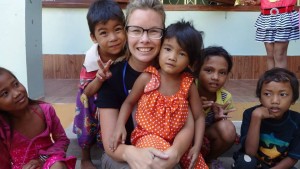Our latest CALI Award winner is Nadia Rice. She is working for Colonial First State and lives in Sydney, Australia. She has traveled through America, Asia and Europe but had her first volunteer experience in an orphanage in Mexico. Since then she has spent the last two years volunteering and fund-raising for an English school in Cambodia called New Hope Cambodia.
Q: Tell us about some of the projects you’re involved in
Nadia: The project I was working on is called The Village Sanitation Project. This is what my fundraising money is being used for. This project was something Jody and I saw as a priority for the village and the people of Mondul Bai. The village has no sanitation and no clean drinkable water.
There are no toilets at all through the village and people go to the bathroom where ever they find a spot. For obvious reasons this is making the village a very unpleasant place to live, unsafe and unsanitary for families to be raised. The waste is now getting into their water supply and making them sick.
The village has water pumps that have been supplied by various charities, and New Hope itself. Many of which have been there for over ten years and are no longer working. Jody had the water supply tested in the village and the water is below Cambodian standards making it obviously unfit to drink or in fact be used for really anything.
The first phase of this project is to have all the broken pumps repaired and to supply filters for each water pump to make the water clean and drinkable.
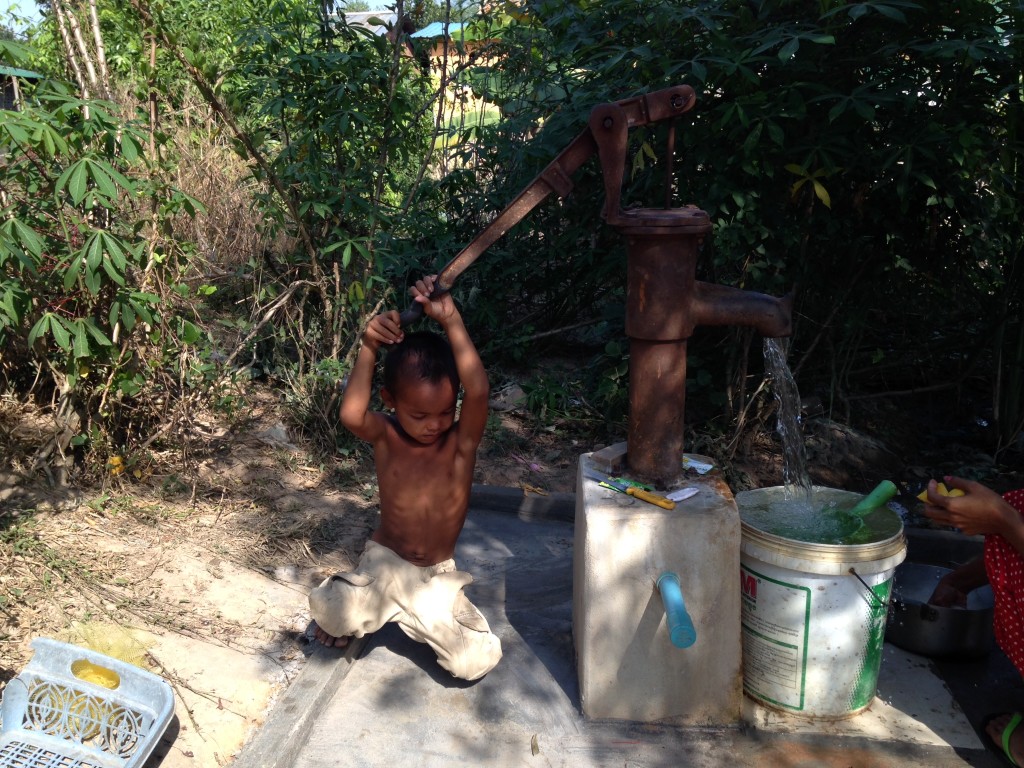
.
After spending four months on my second trip to Cambodia, I completed the audit of the water pumps in entire village as well as some of the surrounding areas where some of our sponsored families are living. In total we checked 191 pumps.
We hired a man who lives in village to fix the pumps. He is part of one of our sponsored families out there so I was very excited to be able to give him some solid work and some good income. He agreed to fix 55 pumps, do minor repairs on 24 and put down 23 new concrete slabs. I also ordered and distributed the first batch of filters. 100 filters.
They are supplied by a company called Water for Cambodia. With a small team, I delivered 100 filters out to various parts of the village and had them installed by another man from one of the sponsored families.
The second phase of the project is to have environmentally friendly self-composting toilets placed into the village to combat the waste problem and prevent further children and their families from developing illnesses and requiring assistance from the clinic.
Thus taking pressure of the already over crowed clinic and it medical supplies. These toilets will be low maintenance and fairly cheap to assemble. We have had engineers out to assess the village and work out the best solution for the toilets.
Q: What inspired you to start and continue to volunteer?
Nadia: Roughly seven years ago I spent three months volunteering in an orphanage in Mexico, and walked away from the experience changed.
I was inspired to volunteer after reading some statistics in the newspaper, that said if everyone in the western world gave a week of their time to charity work of any kind poverty around the world would be reduced significantly and third world countries would not be in the state they are in.
I was 24, on a traveling holiday so it felt like the perfect opportunity to give some time to something other than myself.
Once I came back to Australia, I did other charity work locally but found myself still looking for the fulfillment that I had when I was in Mexico. I had a friend that had done some fundraising work with New Hope Cambodia and I was immediately drawn to it. I was suppose to stay for a month, and ended up staying for four.
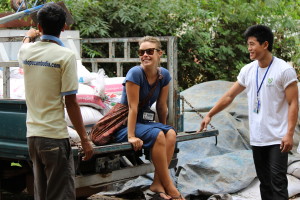 .
.
This time last year, I spent four months volunteering at New Hope Cambodia in both the school and the clinic. I got to know the community, I got to know the families, I taught their kids and I was invited into their homes. I could never have come home and not done something to help my new friends.
My new friends are currently living amongst their own waste and have no access to clean drinkable water. Not only is it disgusting, not only is it unpleasant, the waste is contaminating their water, it is making them sick and our kids are walking through it to get to school. That for me is not ok.
After spending time in this community and learning about the culture, the families, their history and the school I was drawn to help my new friends in any way that I could. I spent my last couple of months in the schools clinic working with an amazing Australian lady named Jody.
She is the services manager and clinical advisor spending her third year with New Hope assisting the people of Mondul Bai and training the Khmer staff to eventually run the clinic without her.
Before I left New Hope, I promised Jody I would fundraise and bring her back $10,000 to use on whatever she saw as a priority. I am proud to say that I didn’t raise $10,000. I raised $25,827. I went back to Cambodia for another 4 months to change this horrible situation and give my new friends a cleaner and safer environment to raise their babies and families in.
Q: What makes New Hope Cambodia different?
Nadia: New Hope Cambodia, in my opinion, is unique because it was founded by a local Khmer, who’s determination, strength of character, passion, and generosity was able to create the incredible organisation New Hope Cambodia is today.
From the small grass hut where it started to the organisation it is today, you certainly wouldn’t think that it’s founder came from extreme poverty and hardship.
Let me start by telling you a little about New Hope Cambodia and Mondul Bai village.
New Hope Cambodia is a grass roots, rapidly growing NGO run and founded as I mentioned, by a local Khmer man Kemsour.
The focus of New Hope is ‘free education for all’. Its founder Kemsour recognises the vital role education plays in helping break the cycle of poverty.
The organisation, however cannot ignore the chronic malnutrition, ill health and horrific living conditions of its community. For this reason, New Hopes activities address the daily issues facing families and finds ways to work toward a better future.
In 2007 Kemsour, purchased land in Mondul Bai after it had been sold off by the army. He soon realised that there was a desperate need for food, education and health care. Much to the dismay of his new wife, Kemsour sold every viable asset they had to build a small grass hut to serve as his classroom. Kemsour taught English and Japanese and eventually founded the New Hope Cambodia organization.
Kemsour himself came from an incredibly poor family. He managed to learn English, Japanese and Thai all under a tree in a field with only a small blackboard. He worked incredible hard to save his money in order to start a small tuk tuk business and buy a home for his wife and children, to then sell it all in order to give his people a chance at a better future.
Mondul Bai is located in one of the of the poorest slum areas in Siem Reap, Cambodia. New Hope is centrally located in Mondul Bai allow the people easy access to its services. The village is now home to more than 300 families made up of army personnel, sex workers and displaced men, women and children.
The people of Mondul Bai have no formal education. Living conditions are appalling, work opportunities limited and food scarce. Children often rely on elderly relatives and sibling for care, or are left to fend for themselves.
In order to survive many girls fall victim to the sex trade and often have children themselves at a young age. Without help these girls have no future and many will die prematurely of sexually transmitted diseases.
New Hope Cambodia provides a range of services to assist this village and its people. The main services provided are free education, health care and their outreach program.
To give you a little idea and feel for New Hope, I will give you a bit of information on each of these services:
Education Program
Most families in Mondul Bai cannot afford public school fees, books or uniforms, and many children are needed at home to mind younger siblings while their parent/s or older siblings attend work or in fact to work themselves to support their family.
New Hope provides free education for 1100 students daily, teaching English, math, computer skills, sex education, equality, sewing and sport. It also supports 250 students undertaking a formal Khmer education and provides funding for uniforms for the public schools, books and bicycles.
The Health Centre
New Hope, with the assistance of sponsors and volunteers, treats up to one hundred residents each day for burns, wounds, salmonella poisoning, infections and illnesses such as malnutrition, HIV, hepatitis, typhoid, tuberculosis and dengue fever.
Preserving health and saving the lives of parents is fundamental to conserving the families of Mondul Bai. In memory of his late wife, Helen, Queensland Pharmacist Chris Bonner contributed significant funds to enable New Hope to relocate and expand their medical facility.
The Helen Bonner Healthcare Centre treats up to 100 patients each day and its medical team performs approximately 1,800 consultations a month. All costs are covered by New Hope Cambodia.
Outreach Program
With the help of sponsors and donations, New Hope feeds 300 impoverished families and 50 starving babies each month. They also issue birth certificates and documents so families will be “legalized” and able to access the public health system, public education, and have the right to vote.
New Hope provides education for women on family planning,childcare, and also repairs housing, installs water pumps and provides mosquito nets, blankets, and bicycles.
.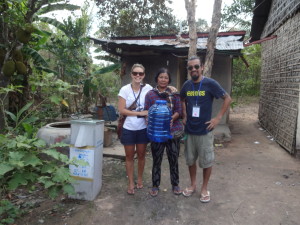
Q: What do you wish people knew about Cambodia?
Nadia: I don’t think anyone goes to a country like Cambodia and doesn’t come back moved or changed in some way. Cambodia is a magical and spiritual place filled with the most inspiring and courageous people you will ever meet.
For me, I wish people knew more about the country’s history and the war that devastated these incredible people. I wish we all were taught more about the atrocities that took place here.
The ruling of the Khmer Rouge and the war saw 2 million Cambodians (from a population of 8 million) murdered and left them with an astonishing 6 doctors and 22 teachers in the entire country. This is why there is so much poverty and lack of education and why I believe helping these people is vital.
I wish people knew and understood that even a little bit helps. The cost of just one cup of bought coffee in Australia is enough to feed a family for a day and is 3-4 times the average income.
Q: What advice do you have for those wanting to travel and make a difference?
Nadia: Pick a country that you want to explore and find out ways to help. For me it was a little village in Cambodia. Find an organisation that has a lot of volunteers helping so you have the opportunity to make new friends. Where possible, organise your volunteering directly with the organisation.
Try not to go through a third party as it will generally cost you a lot more, and less of the money you spend will go directly to the charity itself. Make sure you do your research on any charity or volunteering organisation you choose.
There are thousands of illegitimate charities and organisations that are making money from poverty in third world countries. Read reviews and blogs online to get a feel for the place and an idea of past volunteers experiences.
Q: What is something you are particularly proud of?
Nadia: The filters for the water pumps in the village is what I am most proud of. Clean drinking water is unheard of in a slum like this one in Cambodia. I am proud of the fact that I am spending my fundraising money on a preventative measure which will have an incredible impact on the health and the lives of my friends in Mondul Bai.
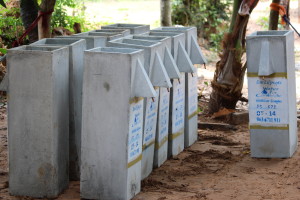
I am also proud of the fact that I am here in Cambodia, actually getting dirty and doing this project as well as showing people who have donated so generously, what I am spending the fundraising money on. Showing people the final product will hopefully allow me to do more fundraising for another project in the future.
Q: What drives you?
Nadia: I read a story while I was in Cambodia about a woman who started her own foundation in Africa. She said she was reading the paper one day about the famine and murder that was happening in Rwanda. She said she became so angry.
She thought Why isn’t someone doing something? Where is the government? Where are the rich people? Where are the celebrities? Then she said she realized that she was someone.
We are someone. I am someone. I am lucky enough to be able to call myself an Australian. I come from a country that is blessed, that is lucky, that is privileged. We have more than what we need here.
But for me that luck, that blessing and that privilege comes with opportunity and it comes with the responsibility to help people that are unable to help themselves. To help people that have been devastated by war.
I feel I am making a real contribution that will change people’s lives. I want to also give back to the people who have been so generous with their donations and make them happy that they trusted me with their money. They are the things that drive me.
Q: If you had your way, everyone in the world would spend 5 minutes a day…
Nadia:Reading a little about countries that are less fortunate then their own.
Connect with Nadia Rice
Website New Hope Cambodia Facebook
Want more inspiration?
- Watch our inspiring mini documentaries
- Read more inspiring CALI award interviews!
- Volunteering overseas? Get yourself a life changing adventure: Free eBook
- How to Get a Vietnam Visa - November 15, 2017
- How to shoot a music festival in the rain! - July 29, 2015
- Which SD card should I buy for Video? - July 24, 2015
